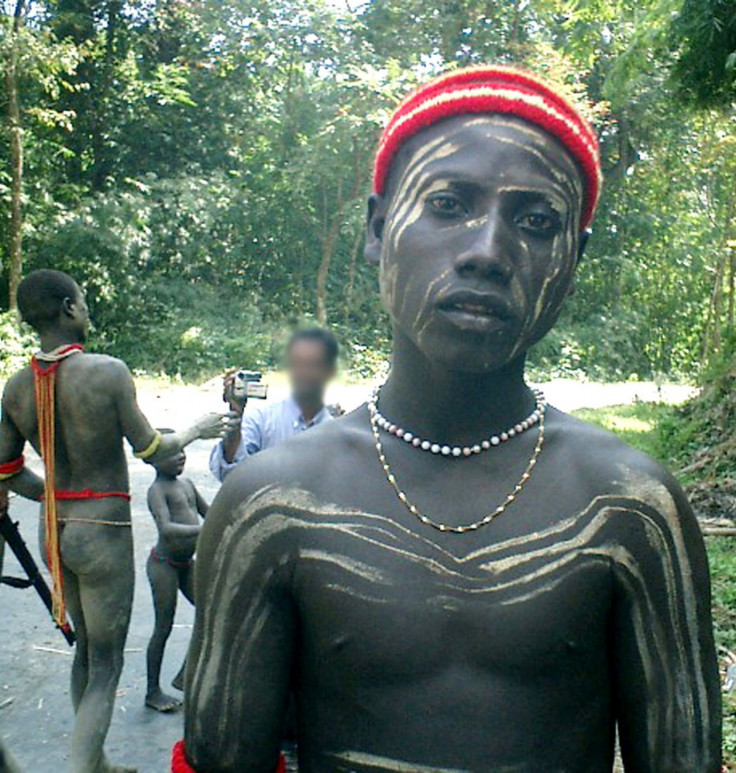'Human Safaris' Threaten Jarawas in the Andamans: Tourists Treat Tribe like ‘Circus Ponies’

The survival of the Jarawa tribe of the Andaman Islands is threatened by a disturbing new trend: human safaris.
First exposed by tribal rights group Survival International in 2010 and brought to light by an unsettling video (below) uploaded by British newspaper The Observer, dozens of visitors to the remote Andaman Islands -- between India and Burma in the Bay of Bengal -- queue up daily at dawn to drive through a jungle reserve set aside for the Jarawa tribe. The tourists then toss scraps of food to the half-naked natives, commanding them to dance.
The video footage posted online is the kind of exotic encounter some tourists dream about when they set out on a so-called safari, but the practice is both devastating and humiliating for the tribe involved.
The Jarawa are taking their first tentative steps toward a relationship with the outside world, having first made contact in the late 1990s.
Some 400-strong, the Jarawas live in the thick forests of South and Middle Andaman hunting pig and monitor lizard and fishing with bows and arrows. Short, dark-skinned with curly hair, they resemble African bushmen in appearance. They are a nomadic people that live in bands of 40-50 and are thought to be amongst the first people to migrate successfully from Africa to Asia.
When Survival International first encountered the practice of human safaris back in 2010, they coerced four of the eight tourism operators to discontinue the tours down the partially closed Andaman Trunk Road.
The Jarawa people lived successfully on their island without contact with outsiders for probably about 55,000 years, until 1998, Stephen Corry, Survival's director, said at the time. Today, a road runs right through their forest home and they risk decimation by disease. They call themselves the Ang, which means 'human being,' yet they are being ogled at like animals in a game reserve.
The very last member of the neighboring Bo tribe died in January, he added. We must not allow the same fate to befall the Jarawa, or the world will lose yet another vibrant, knowledgeable and complex part of humankind.
The Andaman and Nicobar tropical island chain is home to four other rare tribes -- Onge, the Great Andamanese, the Sentinelese and the Shompens, each numbering less than 350 members.
Working with a local organization, SEARCH, Survival has distributed leaflets to tourists arriving at the islands' airport warning of the dangers of using the closed road. Yet, the practice continues as tourists bribe local police with several hundreds of dollars to view the Jarawa.
The story reeks of colonialism and the disgusting and degrading 'human zoos' of the past, Cory said on Monday. Quite clearly, some people's attitudes toward tribal people haven't moved on a jot. The Jarawara are not circus ponies bound to dance at anyone's bidding.
According to Survival's Press Officer Alice Bayer, it's clear what needs to happen.
It's very easy to do these human safaris and a lot of people seem to be doing it, Bayer told the International Business Times. Until they close the road, it's impossible to stop people from going in and trying to get Jarawas to come out.
The Andaman Islands are part of India and the nation has laws designed to protect ancient tribal groups susceptible to outside influence and disease. Photography or coming into contact with the disease-prone Jarawas is, by law, illegal.
A sign at the gate to the enclosure states: Don't give any eatables to the Jarawas. Don't indulge in photography, videography. Otherwise you will be liable for legal action including seizure of camera.
Local Andaman police downplayed the recent video, calling it dated and blaming the British journalist for forcing the Jarawa to dance for tourists.
It is obvious that it is the videographer who is breaking the law of the land and who is inciting the tribals to dance, senior Andaman policeman Shamsher Bahadur Deol said in a statement.
He claimed about 1,000 arrests have been made in the last five years of people trying to make contact with the Jarawas.
However Observer reporter Gethin Chamberlain told the BBC It's one of many videos that are in circulation. He estimates that the video was shot about two or three years ago, but maintains his report on the subject was current. Chamberlain visited the island chain in December.
Tribal Affairs Minister V. Kishore Chandra Deo promised to take action over the incident on Wednesday, calling it obnoxious and disgusting.
It is disgraceful if something like this is happening, Deo said. It cannot be pardoned. It deserves exemplary punishment.
The home ministry also sought a report and Minister P. Chidambaram will reportedly take up the issue with the local administration on a pre-scheduled visit to the islands on Jan. 21.
***This video contains images that may be disturbing. Viewer discretion is advised.
CLICK HERE to listen to a secret recording taken in December of a tour operator in the Andaman Islands telling undercover journalist Gethin Chamberlain to provide 10-15,000 rupees ($180-275) to pay off the police for a tour to the Jarawas.
Read Also:
Thailand's Lost Tribes: The Natives Who Are Not Citizens
Uncontacted Tribe Discovered in Amazon: Who are they and what is their Plight?
Christmas Reindeer Mystery: The World's Largest Herd is Vanishing
© Copyright IBTimes 2024. All rights reserved.












